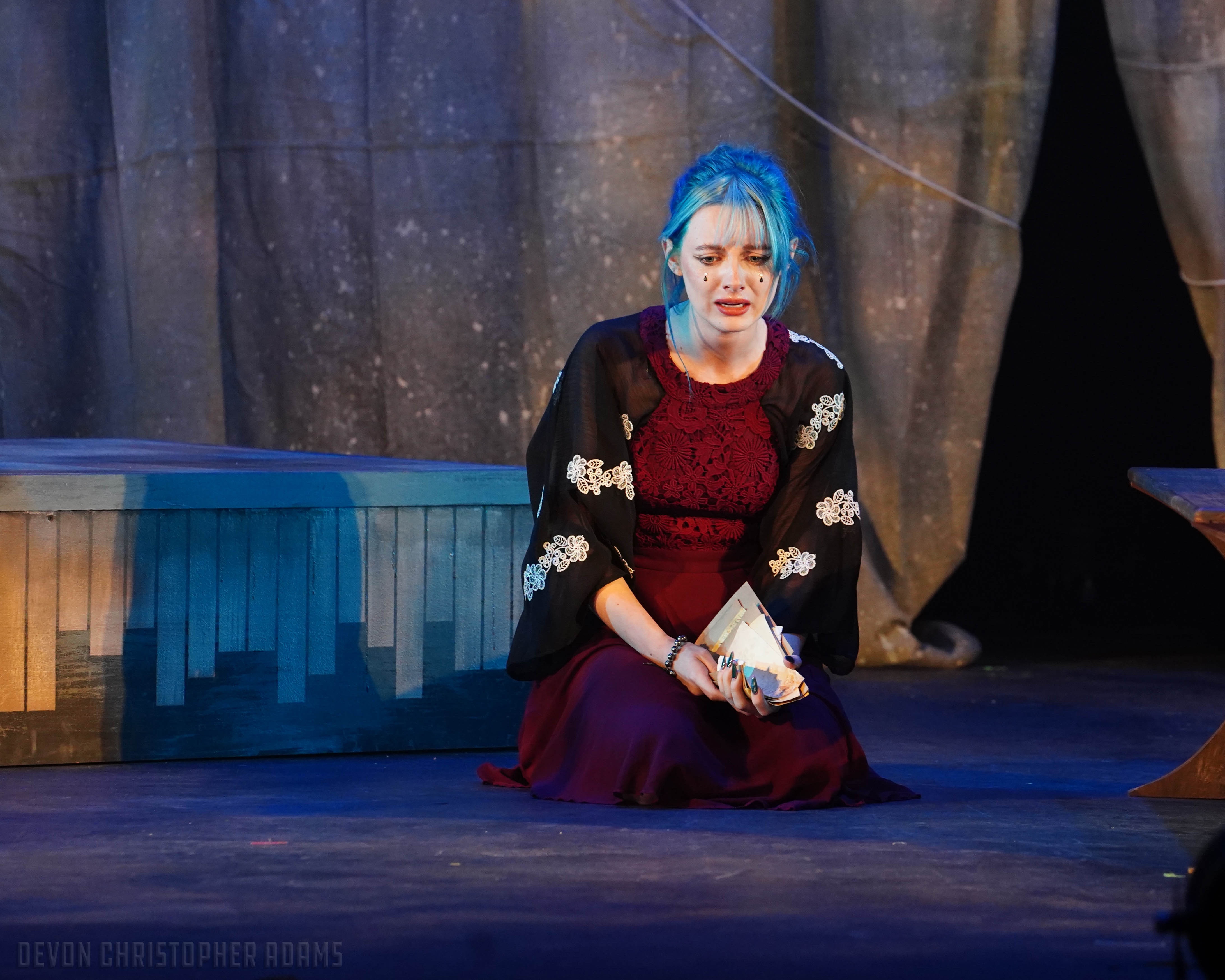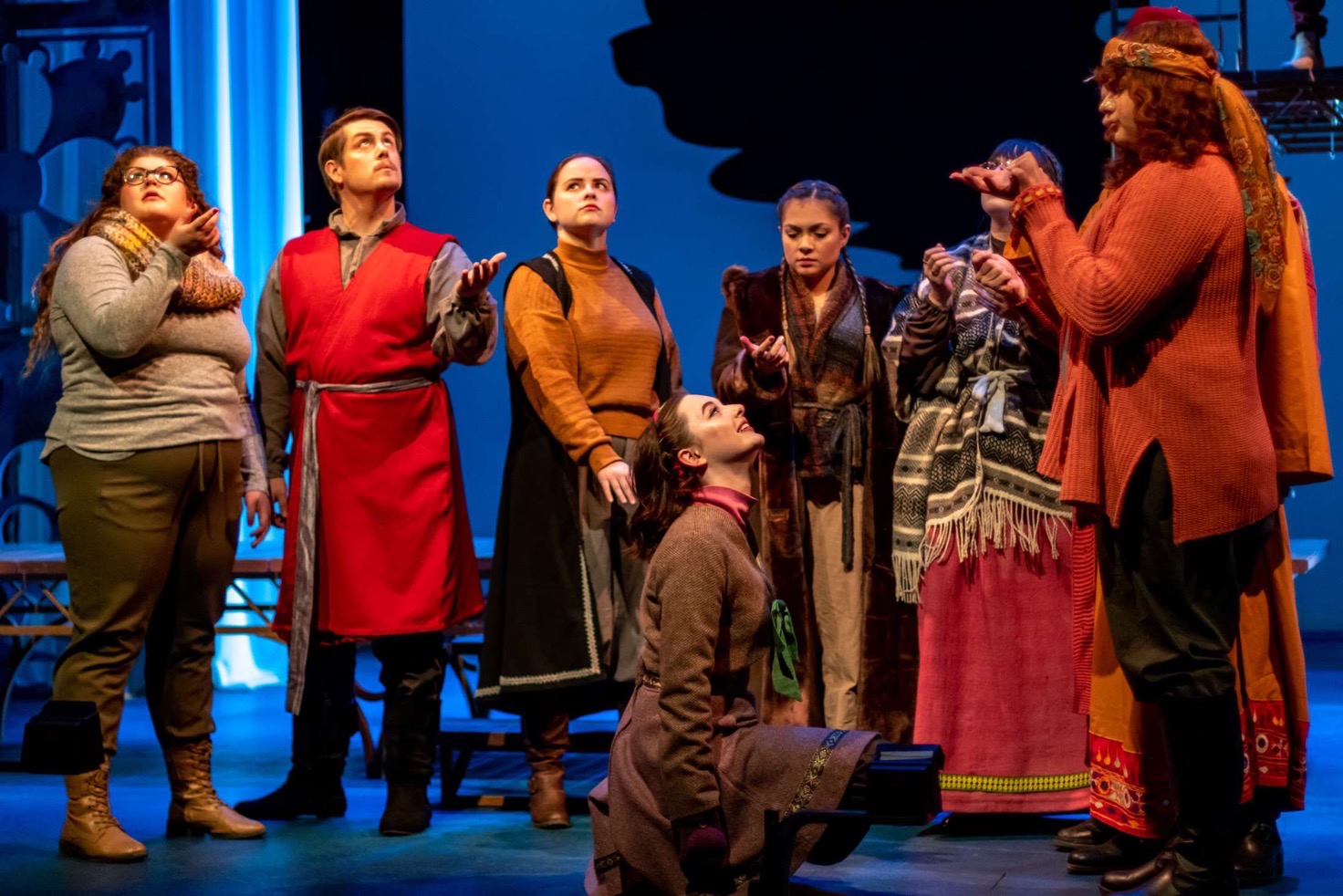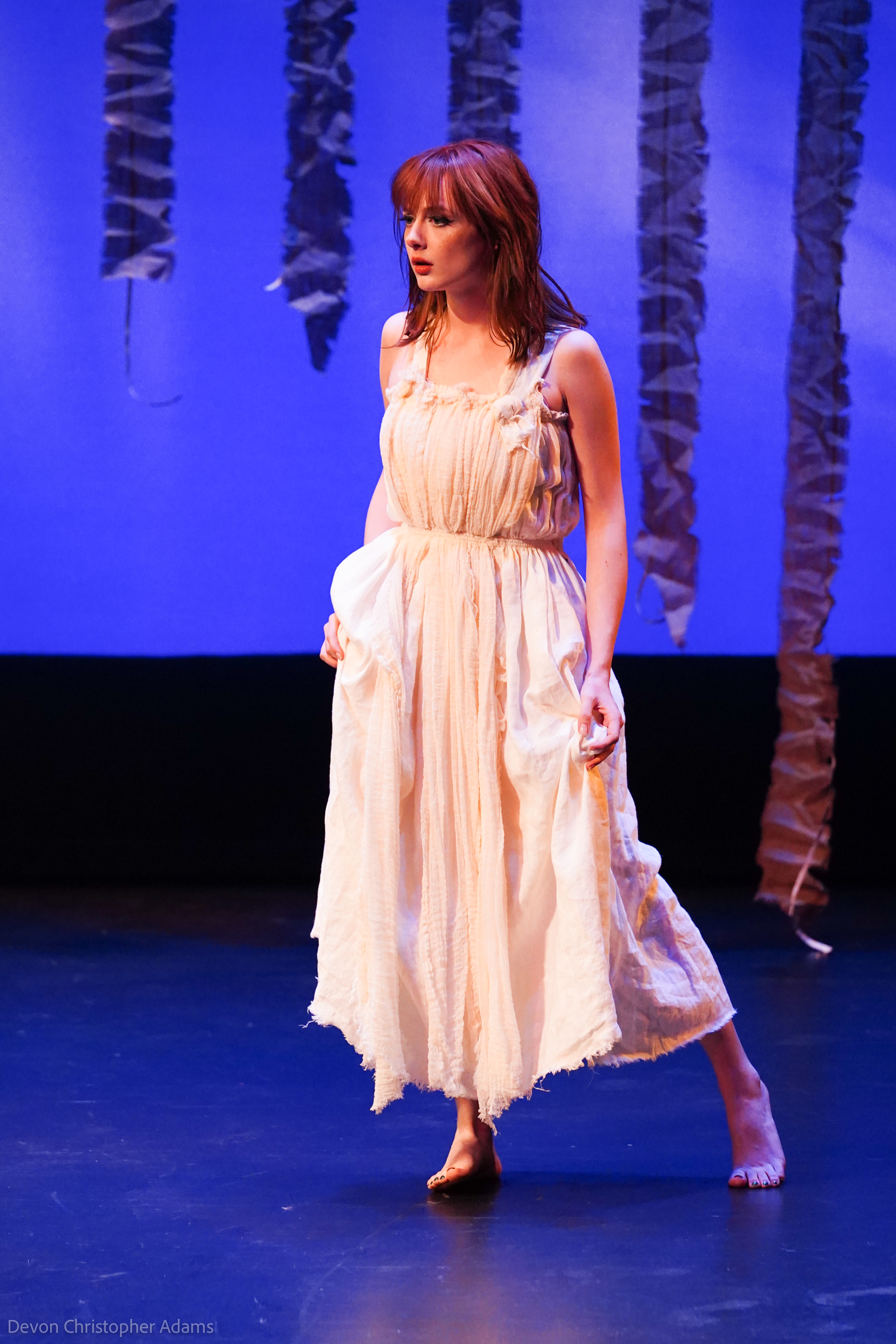ASU grad takes center stage in London

Bronwyn Elizabeth earned a bachelor’s degree in civic and economic thought and leadership from Arizona State University this spring.
Editor's note: This story is part of a series of profiles of notable spring 2022 graduates.
Bronwyn Elizabeth can't wait to see what the future has in store for her. This summer, she moves to London to study classical drama at the world-renowned London Academy of Music and Dramatic Art (LAMDA), just a stone's throw away from Shakespeare’s Globe Theatre. There, she will intertwine two passions: Shakespeare and academic studies. After accumulating successful acting roles, an internship in New York, scholarships and a bachelor’s degree in civic and economic thought and leadership from Arizona State University, the spring 2022 graduate is taking her dreams and skills to the next level.
Bronwyn combines outstanding talent with an insatiable thirst for learning. Associate Professor Kent Wright, who has taught her over the years, said of Bronwyn, “I suspected from the first time I met Bronwyn — sitting in the front row of a CEL 100 class — that she was going to be the kind of student you learn a whole lot more from than you teach. Boy, was that ever right.”
During her tenure at ASU, the graduate of the Barrett, The Honors College at ASU received several accolades, including the Moeur Award, the President’s Scholarship and the Founders Scholarship.
The actress sat down with us to talk about where acting and her classical education from the School of Civic and Economic Thought and Leadership (SCETL) will take her.
Question: What drew your attention to the London Academy of Music and Dramatic Art graduate program?
Answer: I was a member of the core Southwest Shakespeare Company for a few years, and the company receives a grant through the city of Mesa, which allows it to hold great lectures. In my first year of college, I attended one of those lectures with the London Academy of Music and Dramatic Art’s director, Rodney Cottier. Then I attended his lecture again the next year, and again this year. I kept falling in love with the ways that classical acting can be brought to life from an educational standpoint. Simultaneously, I really do love college. So that’s what drew me to the LAMDA program: the opportunity to combine theater and the academic environment.
The only way to do something right is to do it in a way that is fulfilling to you.
— Bronwyn Elizabeth, spring 2022 graduate of the School of Civic and Economic Thought and Leadership
Q: What does the program look like?
A: LAMDA has an incredibly rigorous academic program, but they don’t expect students to write a thesis in a traditional sense. It’s an intense year of studies. We will dive into movement work, Shakespeare’s first folio, his romances, the English kings, the Spanish golden age, Jacobean literature, as well as learn incredible technique programs, such as stage combat, flamenco dancing, accent work, vocal techniques, etc. It’s an academic approach to acting, and I can’t wait to start!
Bronwyn Elizabeth as Miranda in Shakespeare's "The Tempest" for the Southwest Shakespeare Company.
Q: Is there a particular area that you're interested in studying?
A: I love Shakespeare. I’ve worked with the Southwest Shakespeare Company over the last two years and I was their Ophelia in “Hamlet” and Miranda in “The Tempest.” It was incredible to embody these women who were at the foundation of archetypes of women in history. I am confident that my grandmother has read the words that I’ve said in “Hamlet,” and it feels great to be connected to history and lose myself in it. I am fascinated by Shakespeare’s women and other tragic women, and I am lucky to be able to learn a lot more about them in London.
Q: How did you hear about SCETL?
A: I learned about SCETL through my older brother, Cormac. He earned a double major in political science and civic and economic thought and leadership. When I was applying to college, he advised me to apply to SCETL. We are both drawn to discussions and are very similar. He had such a good time at SCETL and he was confident that I would, too. And so I did. The very first class I took was Shakespeare’s Leadership Lessons: Performance and Politics in the Pines, even before my freshman year started. During that course, I read “The Tempest” and fell in love with SCETL. Since then, I haven’t had a single class at SCETL with over 50 students, and it was always the right choice.
Q: Do the smaller class sizes resonate with you?
A: Absolutely. The discussion-based learning environment is fantastic. But more importantly, it was the general feeling that I was a part of the trajectory of the class, rather than the type of environment where you just take notes. I took Professor Kent Wright’s CEL 100 course in my freshman year, then I took every single course he’s taught since then, every semester. He genuinely wants you to learn, instead of wanting to “bestow education” upon you.
I felt special as a student at SCETL because the passion I have for learning was met with the passion the professors have for teaching.
— Bronwyn Elizabeth
Q: How did the intersection between acting and philosophy develop throughout your college years?
A: Right off the bat, I was lucky to meet two professors who love learning: professors Carol McNamara and Kent Wright. They supported my passion for liberal education and acting, and they were instrumental in helping me get an internship with the Patrick Page Acting Studio in New York during the pandemic. They really believed in me and wanted to keep learning with me. And I am grateful for Frank Pina, my academic adviser. He helped make it work for me, was always straightforward and opened doors. When it came time to do my dissertation, Professor Wright sat down with me and said, “I would never stop you from doing a PowerPoint presentation, Bronwyn, but wouldn’t it be fun to do something fresh and new?” My general impression of SCETL is encapsulated in this open-ended question: “Wouldn’t it be fun … ?” They engaged with me on an artistic level through academia. So I just decided I wanted to keep doing this. I love how, during performances of Chekhov, Shakespeare and others, you have to be fully engaged in it, and with my SCETL education, I am able to have a full understanding of the historical context. That’s exactly what SCETL professors push students to do, so it became natural to externalize that onto performances.

Bronwyn Elizabeth as Ophelia in "Hamlet" for the Southwest Shakespeare Company. Photo courtesy of Devon C. Adams
Q: How do you benefit as a dramatic artist from your education at SCETL?
A: I have a great story about this. I recently spoke at a seminar about Miranda, a character I got introduced to during the Shakespeare in the Pines course, the first ASU class I’ve ever taken. I had a piece of introspection I gained at that course, which I lifted from back then. I introduced it during the seminar and my director turned to the audience and said, “Wow. This is what you pay for when you pay for an actor.” SCETL has had a direct contribution to my career as an actor.
My general impression of SCETL is encapsulated in this open-ended question: "Wouldn’t it be fun … ?" They engaged with me on an artistic level through academia. So I just decided I wanted to keep doing this.
— Bronwyn Elizabeth
Q: Are you a different actor today from the one you would have been had you not studied classical liberal education?
A: Absolutely. The choice to pursue classical education as an actress versus a professional training as an actor is purposeful. There’s in-depth academic discussion. I would not have been academically prepared for the LAMDA program had I not done literature analysis throughout the ages and gained the ability to politically contextualize stories, for example. This knowledge is at the foundation of drama, and it is at the foundation of SCETL. It’s organic.
Q: Was that your original plan?
A: No. I came to ASU thinking that I would become a lawyer, but I missed acting, so I started auditioning for these roles. And at one point, I was acting and so in love with all of these characters, and Professor Carol McNamara said to me, “Bronwyn, no one will think less of you if you don’t go to law school. Do what you love!” And it feels so right.
Q: What makes SCETL special?
A: The professors and the relationships you build with them. It feels so communicative and equal. When I talk to professors Wright and McNamara, I learn so much from them, but I feel that they are truly interested in what I have to say. I felt special as a student at SCETL because the passion I have for learning was met with the passion they have for teaching.

Bronwyn Elizabeth (center) as Theodosia in a production of "The Snow," written by Finnegan Kruckemeyer, at the Lyceum Theatre at ASU.
Q: What would you say to an incoming SCETL student?
A: The only way to do something right is to do it in a way that is fulfilling to you. If I had thought at age 18 that I would be pursuing a career in acting today, I would have been very wary. It’s not a stable career, and I had to make peace with it. But know that you are going to work hard wherever you go in life, so make sure you want to go there. SCETL is very malleable with the close relationships you can build with your professors and the wide variety of classes you can take. You can tailor your career based on the conversations you have at SCETL in an infinite number of ways, so seek out discussions that you want to have in this learning environment. Find the professors who are leading those discussions. Take classes with the professors who teach in a way that you like to learn, and realize that the school is so accommodating that you can tailor the rest of your educational journey in that direction.
Q: What is your career goal?
A: Looking at the roles I’ve played and where I am headed, I can say that I’ve had a dream come true almost daily over the last couple of years. I wake up every day and I can’t believe all that’s happening in my life, and can’t wait to see what happens next.
More Law, journalism and politics
Can elections results be counted quickly yet reliably?
Election results that are released as quickly as the public demands but are reliable enough to earn wide acceptance may not…
Spring break trip to Hawaiʻi provides insight into Indigenous law
A group of Arizona State University law students spent a week in Hawaiʻi for spring break. And while they did take in some of the…

LA journalists and officials gather to connect and salute fire coverage
Recognition of Los Angeles-area media coverage of the region’s January wildfires was the primary message as hundreds gathered at…


